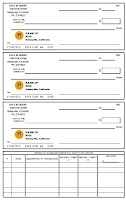COVER LETTERS
Cover Letter “Do’s”
- Address your letter to a specific individual.
- Send an original letter to each employer.
- Use simple language, action verbs, and keep it brief and to the point. Eliminate all unnecessary words and be sure to check for any repetitive wording.
- Write targeted cover letters that are unique to each situation.
- Refer to the job requirements and relate them to your skill set.
- Keep your letter brief and never go beyond one page! Each paragraph should have three to four sentences at the most.
- Tell the employer how you can meet his or her needs and contribute to the company.
- Refer to specific achievements and accomplishments and set yourself apart from other job seekers.
- Make sure your letter answers the question that the employer will be asking while reading your letter: “Why should I hire this person?”
- Never bring any negative tone into a cover letter.
- Be sure you are providing all contact information, such as home phone, cell phone, and email address.
- Keep any e-mailed cover letter shorter and more concise than a letter being postal mailed.
- Don’t send a resume without a cover letter.
- Don’t use a sexist salutation, such as “Gentlemen” when answering a blind ad.
- Don’t waste your first paragraph by writing a boring introduction. Use the first paragraph to grab the employer's attention; give the employer the reason s you are qualified for the position.
- Don’t use such clichés as “Enclosed please find my resume” or “As you can see on my resume enclosed herewith.” Employers can see that your resume is enclosed; they don’t need you to tell them. Such trite phrases just waste precious space. And don't use pleonasms (wordy phrases), which also waste space.
- Don’t depend on the employer to take action. Request action. Request an interview, and tell the employer when you will follow up to arrange it. Then, Do So. It is imperative that you follow up. You will greatly increase your chances of getting interviews if you call the employer after writing instead of sitting back and waiting for a call. Those who wait for the employer to call them will generally have a long wait indeed.
- Don’t send a cover letter that contains any typos, misspellings, incorrect grammar or punctuation, smudges, or grease from yesterday’s lunch.
- Don’t rehash your resume. You can use your cover letter to highlight the aspects of your resume that are relevant to the position, but you’re wasting precious space and the potential employer’s time -- if you simply repeat your resume.
- Don't forget to personally sign the letter, preferably in black ink.
- Simply put, your letters should tell the reader why you are writing, what position you are applying for, what you have to offer, and why this organization is of interest to you. You should close any letter by advising them of your intention to call them in several days, to arrange further discussion of employment opportunities.
Why are you writing - Let the reader know what has prompted you to communicate with them. Was it something you read or heard, if so, paraphrase the content. If your correspondence is in regards to an advertisement, clearly indicate what position you are applying for and where the advertisement was found.
Promise a benefit - Specify special skills, training, or educational experience that may increase the reader’s interest in you. Cite a particular example of a recent accomplishment in a way that will wet the reader’s appetite and help him/her see the benefits that you can bring to the company.
Refer to your particular interest in an organization - Here is an opportunity for you to tell them where your special skills can best be put to use. Through the use of words, create a picture that will actually assist the reader in imagining you as a member of their team.
The closing - This area provides the writer with an opportunity to control further communication and follow through between the writer and the recipient. Always make certain to request an interview. Give an approximate time in which you will contact the company. Never ask them to contact you at their convenience (with exception to executive recruiters and blind ads). Although a cover letter is not intended to land you the job, it most definitely can either increase or hurt your chances of your resume being read.
TYPES OF COVER AND FOLLOW-UP LETTERS
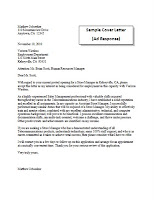 Targeted / Ad Response Cover Letter: The most common way to hunt for jobs is to check newspaper and online listings. Many people turn to the Sunday paper to see who is hiring, how much they are paying, and how much experience these positions demand. The effectiveness of responding to these ads is debatable. Often, companies list openings only because of "open door" regulations, and have already chosen an internal candidate. Many openings are filled through connections before the first letters come in. Other ads are placed by companies or recruitment agencies that simply wish to test the waters. Even if the ad is legitimate, it is sure to attract dozens, even hundreds of other applicants – which is why having a standout cover letter is vital.
Targeted / Ad Response Cover Letter: The most common way to hunt for jobs is to check newspaper and online listings. Many people turn to the Sunday paper to see who is hiring, how much they are paying, and how much experience these positions demand. The effectiveness of responding to these ads is debatable. Often, companies list openings only because of "open door" regulations, and have already chosen an internal candidate. Many openings are filled through connections before the first letters come in. Other ads are placed by companies or recruitment agencies that simply wish to test the waters. Even if the ad is legitimate, it is sure to attract dozens, even hundreds of other applicants – which is why having a standout cover letter is vital.
When responding to an advertised position, spell out in the first sentence where you learned about the job opportunity. List the exact name of the advertised job title, the name of the newspaper the ad was in (or which web site it appeared on) and the day and date the ad ran. Because companies often run several different ads at once or ads for more than one position within a department, writing "I'm responding to the advertised marketing position" may not be enough.
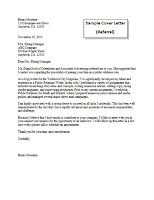 Referral / Networking Cover Letter: Friends, acquaintances and family may sometimes tip you off to openings or currently hiring employers. This necessitates a different approach to the cover letter - the Referral cover letter. Connections are great things that need to be cultivated, so make sure you follow proper networking etiquette. Do not use networking cover letters to ask for a job. People with the power to hire new employees take their responsibilities as gatekeepers seriously, and some stranger asking for a job only turns a gatekeeper off. But networking cover letters asking for career advice, information on the industry or just more contacts can often convince a powerful person like a hiring manager to become a more welcoming mentor. By using all of your connections and sending your cover letter and resume to all contacts will inform them of everything they need to know about you. By the time you do your follow-up phone call, they are prepared to tell you if you can fit into their hiring plan. Depending on how strong the contacts are, they might also be able to give you insider information on how you can make your cover letter and resume even more effective for the company in question.
Referral / Networking Cover Letter: Friends, acquaintances and family may sometimes tip you off to openings or currently hiring employers. This necessitates a different approach to the cover letter - the Referral cover letter. Connections are great things that need to be cultivated, so make sure you follow proper networking etiquette. Do not use networking cover letters to ask for a job. People with the power to hire new employees take their responsibilities as gatekeepers seriously, and some stranger asking for a job only turns a gatekeeper off. But networking cover letters asking for career advice, information on the industry or just more contacts can often convince a powerful person like a hiring manager to become a more welcoming mentor. By using all of your connections and sending your cover letter and resume to all contacts will inform them of everything they need to know about you. By the time you do your follow-up phone call, they are prepared to tell you if you can fit into their hiring plan. Depending on how strong the contacts are, they might also be able to give you insider information on how you can make your cover letter and resume even more effective for the company in question.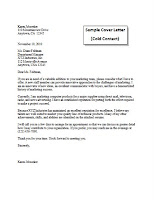 Cold Contact Cover Letter: Companies do not have to have a “hiring” sign hanging on their door in order for you to apply. If you are interested in a particular company, by all means send your cover letter and resume. These types of letters have a great advantage as they show your initiative and genuine interest in a company. The effectiveness of cold mailings ultimately depends upon the establishment you contact. Some well-organized companies actually keep resumes on file and pull them when they begin hiring. But before you rush to mail letters to every Fortune 500 company, understand that most companies lack the organization to take such care with your resume.
Cold Contact Cover Letter: Companies do not have to have a “hiring” sign hanging on their door in order for you to apply. If you are interested in a particular company, by all means send your cover letter and resume. These types of letters have a great advantage as they show your initiative and genuine interest in a company. The effectiveness of cold mailings ultimately depends upon the establishment you contact. Some well-organized companies actually keep resumes on file and pull them when they begin hiring. But before you rush to mail letters to every Fortune 500 company, understand that most companies lack the organization to take such care with your resume.
Be sure to demonstrate your interest in a company by presenting your knowledge about that company's history, current projects, and business plan. Once you know its plan for the future, you can tell the company how you will contribute to that strategy.
Make sure you're addressing an individual. Call reception and ask for the head of the department in which you're interested. Hiring decisions are made by the people within the department, not Human Resources, so if you have a choice, avoid HR. Contacting an individual can also create a feeling of personal responsibility in the reader that might save your documents from the shredder. Seeing one's own name creates a sense of accountability that an anonymous posting doesn't inspire.
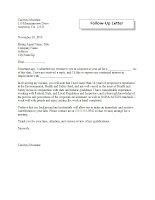 Follow-Up Letter: When a company opens a position for hiring, they can receive hundreds of applications for a single job. It is very easy for your application packet to get lost in the pile. When a company received additional information (like a professional Follow-Up Letter), they pull the application to attach the new document – which often brings your application back to the top of the pile. This not only adds name recognition [helps them remember you] but allows you another chance to tell them why they should hire you.
Follow-Up Letter: When a company opens a position for hiring, they can receive hundreds of applications for a single job. It is very easy for your application packet to get lost in the pile. When a company received additional information (like a professional Follow-Up Letter), they pull the application to attach the new document – which often brings your application back to the top of the pile. This not only adds name recognition [helps them remember you] but allows you another chance to tell them why they should hire you.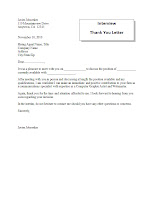 Thank You Letter: If you managed to make it through the first stage [your application packet was accepted and screened] and then you made it through the second stage [you received an interview] you are probably in the top few candidates for the job. Another way to stand out above your competition is to send a Thank You Letter. The Thank You Letter is a way to thank the person/people that interviewed you, to remind them what position you interviewed for, to let them know that you are still interested in the position, and to give them a specific benefit you would offer their company. Because you want to be specific, make sure you note some things you learned about the company during the interview. This will let the employer know that you have taken the time and interest [and felt they were important enough] to learn about them.
Thank You Letter: If you managed to make it through the first stage [your application packet was accepted and screened] and then you made it through the second stage [you received an interview] you are probably in the top few candidates for the job. Another way to stand out above your competition is to send a Thank You Letter. The Thank You Letter is a way to thank the person/people that interviewed you, to remind them what position you interviewed for, to let them know that you are still interested in the position, and to give them a specific benefit you would offer their company. Because you want to be specific, make sure you note some things you learned about the company during the interview. This will let the employer know that you have taken the time and interest [and felt they were important enough] to learn about them.
Not only will a Thank You Letter bring your name back to the top of the pile, but it will make you more memorable – and often will be the deciding factor if the employer is trying to decide between two or three candidates.


